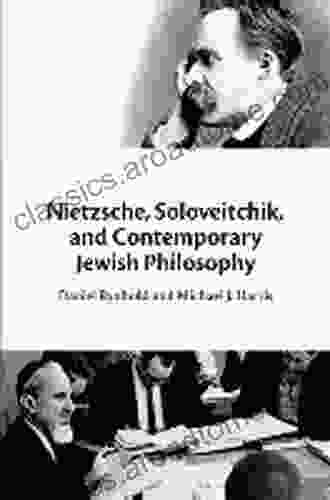Nietzsche, Soloveitchik, and Contemporary Jewish Philosophy: Interwoven Intellectual Landscapes

4 out of 5
| Language | : | English |
| File size | : | 1655 KB |
| Text-to-Speech | : | Enabled |
| Screen Reader | : | Supported |
| Enhanced typesetting | : | Enabled |
| Word Wise | : | Enabled |
| Print length | : | 326 pages |
: The Nexus of Two Philosophical Titans
In the realm of thought, few figures loom as large as Friedrich Nietzsche and Joseph B. Soloveitchik. Nietzsche, the iconoclastic philosopher of the 19th century, and Soloveitchik, the influential Jewish thinker of the 20th century, offer contrasting yet profound insights into the human condition.
This article explores the intriguing intersections between the philosophies of Nietzsche and Soloveitchik, examining their influence on contemporary Jewish thought.
Nietzsche's Existentialism and the Question of Meaning
Nietzsche's philosophical journey began with an interrogation of traditional values and morality. He proclaimed the "death of God" and argued that the advent of modernity had shattered the absolute foundations of meaning that had once anchored human existence.
In the face of this existential void, Nietzsche proposed a radical philosophy of self-creation and the affirmation of life. He encouraged individuals to embrace their own unique potential and strive for a life of authenticity and vitality.
Soloveitchik's Halakhic Judaism and the Quest for Holiness
Soloveitchik, a prominent figure in the Orthodox Jewish tradition, offered a compelling response to the challenges posed by modernity. Rather than rejecting the world, Soloveitchik sought to engage with it, emphasizing the importance of living a meaningful life within the framework of Halakhic law.
Soloveitchik's philosophy centered on the idea of self-transcendence through the observance of mitzvot (commandments). By adhering to the divine commandments, individuals could break free from the limitations of their own egocentricity and connect with a higher spiritual realm.
Intersections and Points of Departure
Despite their starkly different starting points, Nietzsche and Soloveitchik's philosophies share surprising points of intersection.
- Existential Authenticity: Both Nietzsche and Soloveitchik recognized the importance of authenticity. Nietzsche encouraged individuals to create their own values and live according to their true selves, while Soloveitchik emphasized the need to be true to one's covenant with God.
- The Role of Suffering: Nietzsche saw suffering as an inherent part of human existence, a catalyst for growth and self-discovery. Soloveitchik, too, acknowledged the unavoidability of suffering but framed it within a theological context, suggesting that it could serve as a purifying force and an opportunity for spiritual elevation.
- The Question of Theodicy: Both Nietzsche and Soloveitchik grappled with the problem of evil and suffering in the world. Nietzsche famously denied the existence of a benevolent God, while Soloveitchik offered a more nuanced understanding, arguing that the ways of God were often beyond human comprehension.
However, there are also fundamental differences between their philosophies.
- Ultimate Value: Nietzsche believed that life itself was the ultimate value, to be embraced and affirmed. Soloveitchik, on the other hand, placed the highest value on spiritual perfection and the observance of God's commandments.
- The Role of God: Nietzsche rejected the notion of a personal God, while Soloveitchik embraced the existence of a transcendent and loving God.
- The Nature of Human Nature: Nietzsche viewed human beings as essentially selfish and competitive, while Soloveitchik saw humans as capable of great altruism and self-sacrifice.
Contemporary Jewish Philosophers Engage with Nietzsche and Soloveitchik
The philosophies of Nietzsche and Soloveitchik have had a profound impact on contemporary Jewish thought.
Some Jewish thinkers, such as Hillel Halkin and David Hartman, have embraced Nietzsche's critique of traditional values and seen in his philosophy a call to spiritual renewal. Others, like Michael Wyschogrod and Avivah Zornberg, have looked to Soloveitchik's ideas for guidance in navigating the complexities of modern life.
The ongoing dialogue between Nietzsche, Soloveitchik, and contemporary Jewish thinkers continues to enrich our understanding of the human condition and the possibilities for meaningful living within a rapidly changing world.
: Nietzsche, Soloveitchik, and the Future of Jewish Philosophy
The intellectual legacies of Nietzsche and Soloveitchik are both profound and enduring. Their contrasting philosophies offer unique perspectives on the human experience and the quest for meaning.
The ongoing engagement with their ideas by contemporary Jewish philosophers ensures that the conversation between the two philosophical giants will continue to shape the landscape of Jewish thought for generations to come.
This article has provided an overview of the complex relationship between Nietzsche, Soloveitchik, and contemporary Jewish philosophy. For a more in-depth exploration of this topic, I highly recommend reading the book Nietzsche, Soloveitchik, and Contemporary Jewish Philosophy, edited by Edward Kessler and Steven Kepnes. This book brings together a collection of essays by leading scholars, offering diverse perspectives on this fascinating philosophical dialogue.
4 out of 5
| Language | : | English |
| File size | : | 1655 KB |
| Text-to-Speech | : | Enabled |
| Screen Reader | : | Supported |
| Enhanced typesetting | : | Enabled |
| Word Wise | : | Enabled |
| Print length | : | 326 pages |
Do you want to contribute by writing guest posts on this blog?
Please contact us and send us a resume of previous articles that you have written.
 Book
Book Novel
Novel Page
Page Chapter
Chapter Text
Text Story
Story Genre
Genre Reader
Reader Library
Library Paperback
Paperback E-book
E-book Magazine
Magazine Newspaper
Newspaper Paragraph
Paragraph Sentence
Sentence Bookmark
Bookmark Shelf
Shelf Glossary
Glossary Bibliography
Bibliography Foreword
Foreword Preface
Preface Synopsis
Synopsis Annotation
Annotation Footnote
Footnote Manuscript
Manuscript Scroll
Scroll Codex
Codex Tome
Tome Bestseller
Bestseller Classics
Classics Library card
Library card Narrative
Narrative Biography
Biography Autobiography
Autobiography Memoir
Memoir Reference
Reference Encyclopedia
Encyclopedia Benjamin Muschko
Benjamin Muschko G R M Garratt
G R M Garratt Sally Kirkman
Sally Kirkman Andrew Holleran
Andrew Holleran Angeli Rodriguez
Angeli Rodriguez Aminah Raheem
Aminah Raheem Ying Chang Compestine
Ying Chang Compestine Pilar Jennings
Pilar Jennings Anita Farber Robertson
Anita Farber Robertson Scott Guelich
Scott Guelich Anita Cocktail
Anita Cocktail Andrey Akinshin
Andrey Akinshin Kate Labrosse
Kate Labrosse Angela Banner
Angela Banner Andrei P Kozlov
Andrei P Kozlov Kate Kelly
Kate Kelly Andrew Goudie
Andrew Goudie Amy Berger
Amy Berger Frank E Eyetsemitan
Frank E Eyetsemitan Andrew Ojala
Andrew Ojala
Light bulbAdvertise smarter! Our strategic ad space ensures maximum exposure. Reserve your spot today!
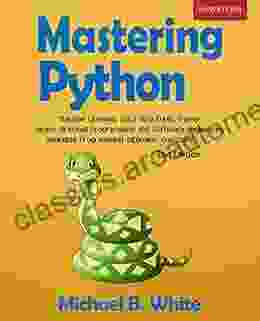
 Isaiah PowellMachine Learning, Data Structures, Django, and Object-Oriented Programming:...
Isaiah PowellMachine Learning, Data Structures, Django, and Object-Oriented Programming:... Robert Louis StevensonFollow ·19.5k
Robert Louis StevensonFollow ·19.5k Felix HayesFollow ·5.5k
Felix HayesFollow ·5.5k Harvey HughesFollow ·4.6k
Harvey HughesFollow ·4.6k Angelo WardFollow ·18.5k
Angelo WardFollow ·18.5k Oscar WildeFollow ·9.7k
Oscar WildeFollow ·9.7k Duncan CoxFollow ·2.2k
Duncan CoxFollow ·2.2k Emanuel BellFollow ·10.1k
Emanuel BellFollow ·10.1k Raymond ChandlerFollow ·7.7k
Raymond ChandlerFollow ·7.7k
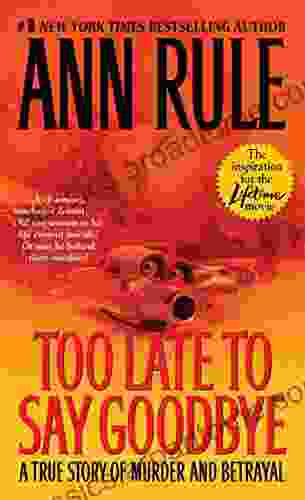
 Braden Ward
Braden WardThe True Story of Murder and Betrayal
In a small town where...
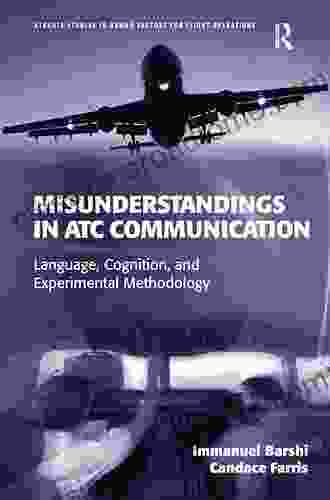
 W. Somerset Maugham
W. Somerset MaughamUnraveling the Complexities of Human Language: A...
Language is a fundamental aspect of human...
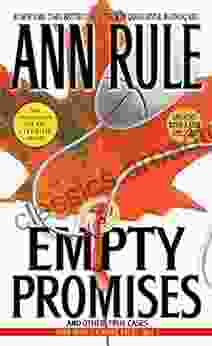
 Ibrahim Blair
Ibrahim BlairTrue Crime Tales That Will Keep You on the Edge of Your...
Prepare to be...
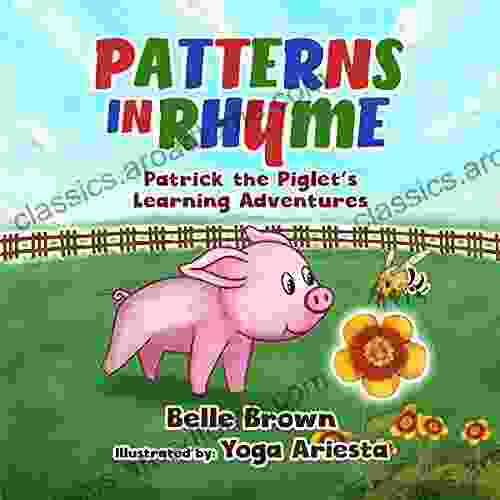
 Rick Nelson
Rick NelsonPatterns In Rhyme: A Journey of Discovery with Patrick...
Welcome to the...

 Edgar Hayes
Edgar HayesWithout Pity: Unmasking the Evil Within
In the realm of true...

 Cooper Bell
Cooper BellFannie Lou Hamer's Indelible Legacy: Unraveling the...
The Black Freedom Movement, a pivotal...
4 out of 5
| Language | : | English |
| File size | : | 1655 KB |
| Text-to-Speech | : | Enabled |
| Screen Reader | : | Supported |
| Enhanced typesetting | : | Enabled |
| Word Wise | : | Enabled |
| Print length | : | 326 pages |


